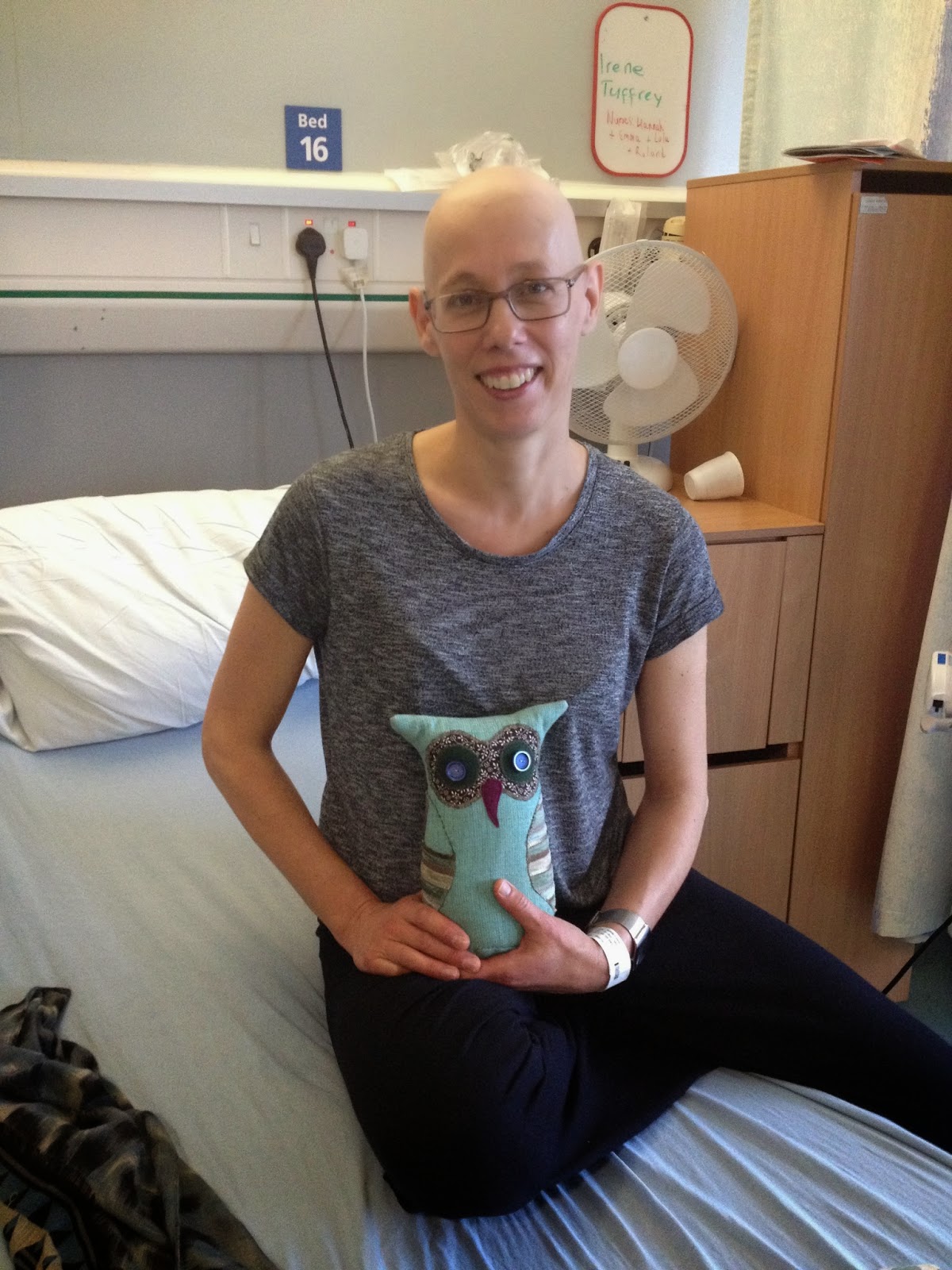 |
| I took this picture of the VIP lounge after-hours, when I was hospitalised. Empty of patients, I can now show you the whole room. My sister-in-law, who came to pick me up, was amazed. "I'd imagined it to be a bit more private!" But I quite like the squashed-close-together effect. It makes it more interesting. |
I recruited my son this time to be my personal assistant, it being the half term holidays. Following hot on the heels of a week with a German family on a school language trip, I reckon he'll have had his fill of Cultural Experiences. I've shown him round the ward ("This is where I was admitted," and - crucially - "This is where you make the hot chocolate", which is mostly what he's here for). Cancerland probably has more of an alien culture than Deutschland. Beer beats NHS hot chocolate, I suspect.
I've urged my nurse to slow he drip right down, remembering last time's collapse, so we'll be here for several hours. My son has wisely brought his homework and his headphones and a gadget with a film on it.
Unfortunately, the nurse has put the drip in the back of my left hand. Every time I type and flex my fingers, the machine beeps in protest, so it's slow one-handed typing.
I told my consultant what some doctors had said about the cause of my temperatures.
In absence of a clear source of infection, they thought, it was probably simply a way of my body protesting against the invasion of Docetaxel (the vicious chemo drug). The consultant batted this theory away as if it was a noisy but useless insect.
"I have never heard of that," she said in a What on earth do they teach the doctors these days kind of voice. "You must just have had one of the more obscure viruses that we haven't tested you for."
This is the problem with an imprecise art like chemotherapy. Or with any kind of medical intervention, come to think of it. Doctors and nurses contradict each other, sending me to search the archives of the British Medical Journal and The Lancet for the research evidence. But this time, I took the consultant's word for it.
So I agreed to her suggestion that we push on as planned. She did offer to reduce the dose by 10 or 20%.
Oh dear... Ten minutes into the Docetaxel, and suddenly I can't breathe. Head swimming. Excuse me a minute...
90 minutes later:
Back again. It was a mild reaction this time, just shortness of breath and a whoozy brain. I've had extra drugs, making me rather sleepy, but never mind, I've got "Bed" booked in for the next fortnight. Aromatherapy Man has been round to work his magic, adding another soporific layer. Now the Docetaxel is back on, and I'm determined to finish writing this blogpost.
"And the rationale for reducing the dose of chemo would be...?" my husband wanted to know.
Well, there wasn't really one. Not a physical one, anyway. But this particular chemo drug, she explained, is renowned for knocking people out completely. I have this image of myself, running, walking and then crawling to the finishing line, flattened by each round of chemo, and every time I scramble back to my feet I get another wack over the head, sending me face down into the mud again. "Getting there! Only two more!" people tell me encouragingly, but at the face-down times that seems an impossibly long way to go. Don't tell me... Two full rounds, almost two more months of eating mud. Help.
"I saw a patient this morning," the consultant went on, "who was so knocked out by her first dose of Docetaxel... I thought, if I give her the same dose again, I won't be able to get the last ones in."
"She won't come back", was the implication.
And who could blame her? Why willingly come back for more, if it makes you so very ill? Sometimes, the misery just outweighs the benefits. I also think of the many people who have little grasp of possible benefits hiding far into the future, people with dementia or intellectual disabilities or simply live-for-today attitudes. The mind boggles. Even I, with all my professional expertise and quiet fortitude, have to brace myself at the sight of the VIP lounge. Don't go in there! my body warns, sending me a complimentary wave of nausea just to convince me. They do nasty things to you!
But here I am, and it's not just because the consultant has convinced me that my body will cope. It is also because I look back through the distorting tunnel of time, and I think, Well, it wasn't too bad, really. I've just got back onto my feet and I can see the finishing line myself now. Who said again that I had only two more to go? Thank you! Now there's an encouraging thought!
Back me up here. It wasn't that bad, was it? Fevers and hospitals aside, I feel better able to cope with tiredness-beyond-tiredness and bone pains than with the nausea and chemo tongue combo. And, I reported to the consultant with a certain degree of relieved triumph, I didn't get the numb fingers thing! Hallelujah!
"No," she dropped in casually, "you don't usually get that until the second time." Oh. There I was, counting my chickens, or, as they say in Holland, selling the hide before I shot the bear.
My bag of Docetaxel has almost emptied itself into my veins. I'll go home soon to an empty diary and a beckoning bed. I'm almost, almost looking forward to it. But this time, I've got my hospital bag ready just in case.
Goodnight and see you in a while.
Let's just hope that at the end of this chemo cycle, I'll have some hatched chickens and a bear hide to sell.
.JPG)
.JPG)
.JPG)





